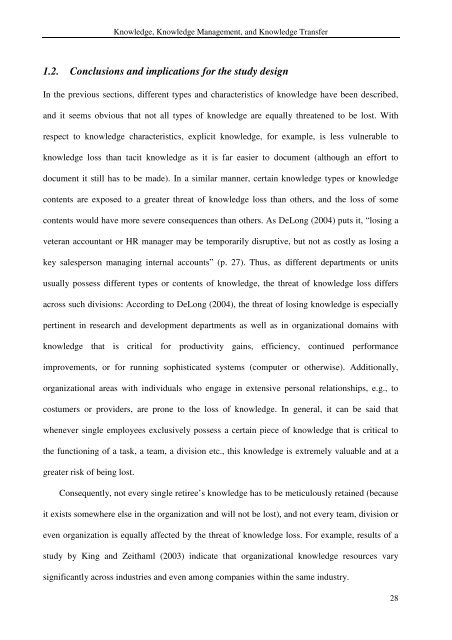thesis_Daniela Noethen_print final - Jacobs University
thesis_Daniela Noethen_print final - Jacobs University
thesis_Daniela Noethen_print final - Jacobs University
Create successful ePaper yourself
Turn your PDF publications into a flip-book with our unique Google optimized e-Paper software.
Knowledge, Knowledge Management, and Knowledge Transfer<br />
1.2. Conclusions and implications for the study design<br />
In the previous sections, different types and characteristics of knowledge have been described,<br />
and it seems obvious that not all types of knowledge are equally threatened to be lost. With<br />
respect to knowledge characteristics, explicit knowledge, for example, is less vulnerable to<br />
knowledge loss than tacit knowledge as it is far easier to document (although an effort to<br />
document it still has to be made). In a similar manner, certain knowledge types or knowledge<br />
contents are exposed to a greater threat of knowledge loss than others, and the loss of some<br />
contents would have more severe consequences than others. As DeLong (2004) puts it, “losing a<br />
veteran accountant or HR manager may be temporarily disruptive, but not as costly as losing a<br />
key salesperson managing internal accounts” (p. 27). Thus, as different departments or units<br />
usually possess different types or contents of knowledge, the threat of knowledge loss differs<br />
across such divisions: According to DeLong (2004), the threat of losing knowledge is especially<br />
pertinent in research and development departments as well as in organizational domains with<br />
knowledge that is critical for productivity gains, efficiency, continued performance<br />
improvements, or for running sophisticated systems (computer or otherwise). Additionally,<br />
organizational areas with individuals who engage in extensive personal relationships, e.g., to<br />
costumers or providers, are prone to the loss of knowledge. In general, it can be said that<br />
whenever single employees exclusively possess a certain piece of knowledge that is critical to<br />
the functioning of a task, a team, a division etc., this knowledge is extremely valuable and at a<br />
greater risk of being lost.<br />
Consequently, not every single retiree’s knowledge has to be meticulously retained (because<br />
it exists somewhere else in the organization and will not be lost), and not every team, division or<br />
even organization is equally affected by the threat of knowledge loss. For example, results of a<br />
study by King and Zeithaml (2003) indicate that organizational knowledge resources vary<br />
significantly across industries and even among companies within the same industry.<br />
28

















